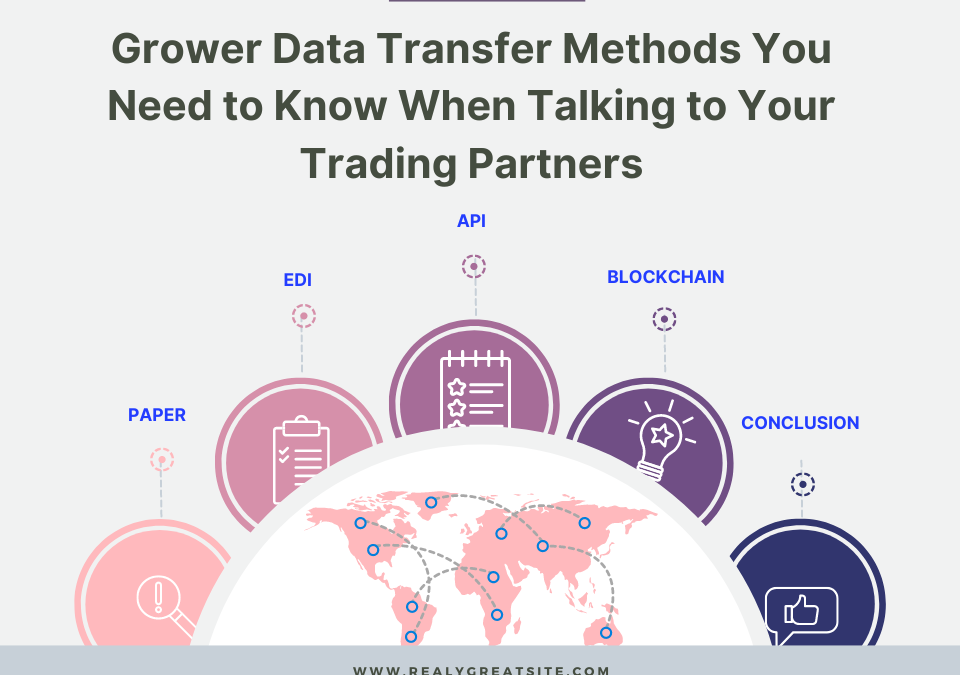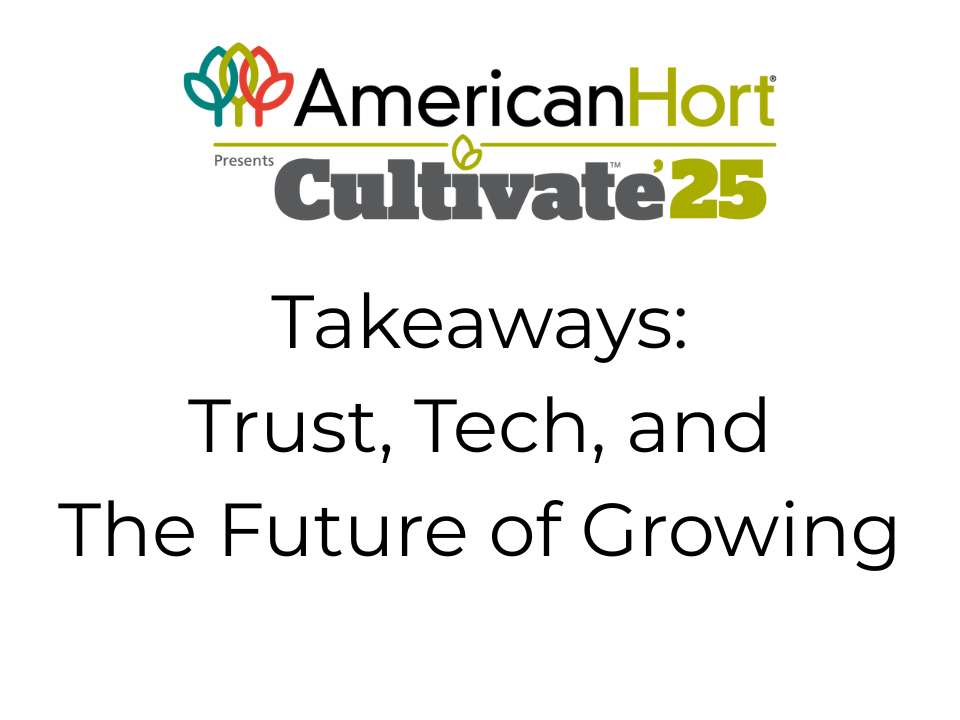
Important Pay By Scan Statistics to Understand
November 30, 2022
Keys To Success In Pricing Pay By Scan Programs For Growers
December 27, 2022Growers have many ways they need to transmit data back and forth to customers and suppliers. Even growers of small sizes must support a variety of transaction types to do business across the spectrum of their suppliers and customers (also referred to as trading partners).
Growers typically need some of these types of data transactions to and from their trading partners.
- Price Lists
- Availability
- Orders and Order changes and acknowledgements
- Shipping Notices
- Invoices
- Credits
- Payment Notices
- others….
Each of these grower transactions contain many important data fields required to complete the transaction.
Once a grower has all the required data the issue becomes how to get that data to the trading partner reliably and securely?
Here are some ways to make that happen.
Paper
This is the mode that all growers understand. Paper invoices and paper checks as payments are still prevalent in most parts of our industry.
While paper transactions are viable methods for any grower, paper transactions don’t scale well as the business transaction volume grows and becomes more complex.
In spite of thousands of years of use and continued importance paper possesses some disadvantages:
- Speed – delay in sending via mail delivery.
- Data Re Entry – any paper document must be entered into the receiver’s system for processing.
- Note: some systems allow scanning of these documents and auto-processing but this requires stringent setup and monitoring (at this point in the technological evolution).
- Ambiguity – determining what this invoice was for (related records in the grower system) or how this payment was applied (by the customer) generates additional work on the back-office side.
Despite these disadvantages, for many growers paper will be a reality in some of their business processes for the foreseeable future due to its low barriers to entry and overall ubiquity.
EDI
Many growers use some form of EDI (Electronic Data Interchange) which, at its core, is a structured file transfer.
EDI requires specialized software that can connect to a trading partner, read and translate the standard data formats defined by EDI standards and provide responses to the receiver.
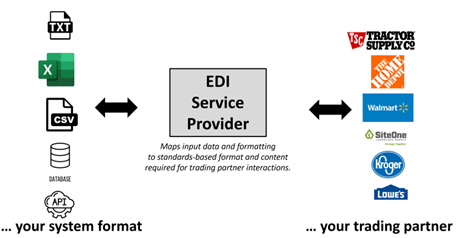
High Level Data flow for EDI
Copyright Advanced Grower Solutions
This specialized software is typically owned and managed by 3rd party solutions (like GrowerEDI) which handle all that complexity for you. EDI services can also give you the requisite data in a format that is compatible with your system, even Excel for some growers.
There are also systems that can be purchased and installed locally for growers with the needed technical staff. The data and formats can be complex and arcane so if you go the do-it-yourself EDI route make sure your technical staff is capable of handling the complexity these systems create.
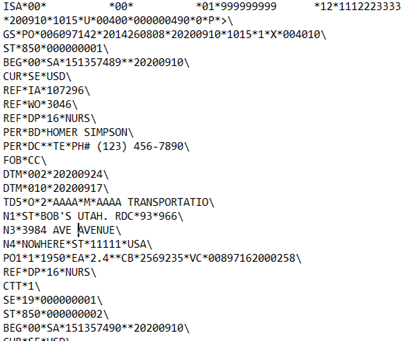
Sample EDI X12 850 Document
Copyright Advanced Grower Solutions
In an EDI transaction, the key data elements needed for a transaction, say an order, into an agreed to format and send that data to the EDI provider which, using their system will ‘map’ the provided data into the necessary X12 (or other) EDI format and facilitate the sending to the trading partner and getting the received receipt transaction (called a 997 document in most common cases).
Growers that use EDI also have back-end systems for inventory or accounting that use their own databases which will source or ingest the final formats needed for EDI conversion.
API
An API or Application Program Interface is another way that software running on separate systems can interact by sending and receiving data in a specified way.
An API is a programmatic way, built into software, for a system to construct all the key data elements needed for a transaction, say an order, into a defined format and send that data to the receiving system to be processed automatically.
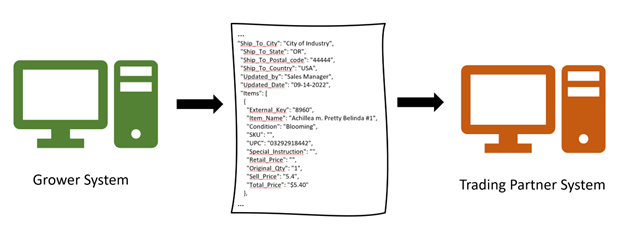
Example API Data between systems
Copyright Advanced Grower Solutions
Note: with API driven systems the source and destination data is still stored within a database of the grower or their trading partner.
Blockchain
Blockchain is a new and exciting technology that many conflate with crypto currencies. However, blockchain is not crypto currency, it is an interface and storage technology that is used by crypto currency to publicly record and verify transactions. While the most trending use of blockchain is in supporting crypto currency transactions, it has many potential uses in a variety of industries.
At its simplest, a blockchain is a distributed (not controlled by a single entity) storage and ledger with immutable and verified history. Blockchain protocols include mechanisms for transaction veracity and synchronization.
Blockchain based transactions and related systems are being used in some supply chain processing. Food product lifetime tracking, food safety transactions and transfer of custody are a few solutions being used in supply chain processing with blockchain. Additionally tracking public ownership records like property or car titles and associated transfer of ownership is also a candidate for blockchain being explored.
Additionally, by coupling ‘smart contract’ capabilities which are provided by some blockchain frameworks and protocols, automation can be enhanced between supplier and customer.
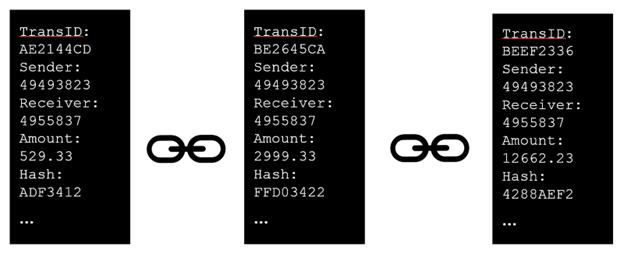
Fictitious simplified blockchain structure data representation example
Copyright Advanced Grower Solutions
The advantage of public blockchain, for some use cases, is visibility to any interested parties. For confidential information that needs more than anonymized data fields, a private blockchain implementation may be a better alternative for data transfer.
Most grower software doesn’t need to interact with blockchain at this time but in the future instances of interacting with trading partners that may necessitate blockchain transactions (either public or private).
Conclusion
Automating mundane aspects of trading partner transactions can bring growers improved efficiencies in back-office processing, supply chain visibility and better decision making with improved data accessibility.
However, to realize these benefits the interface between grower and trading partner has to be considered. As business moves forward new methods of information transfer between growers and their trading partners can unlock additional value.
Find Out More
To learn more about how DTS/Merch can help your vendor management inventory tasks or to schedule a demo contact us.

